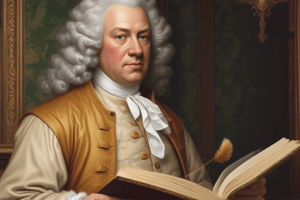Podcast
Questions and Answers
Samuel Seabury warns against the revolution, claiming that those who promote it:
Samuel Seabury warns against the revolution, claiming that those who promote it:
- Seek peaceful resolutions through dialogue.
- Have the best economic policies.
- Do not have your interests at heart. (correct)
- Are supported by the King of England.
In the exchange, Alexander Hamilton criticizes Seabury primarily for:
In the exchange, Alexander Hamilton criticizes Seabury primarily for:
- Advocating for complete separation from Britain.
- His eloquence and persuasive arguments.
- Supporting the Continental Congress.
- Repeating himself and lacking substantive debate. (correct)
When Hamilton says, 'And what about Boston? Look at the cost, n' all that we've lost,' he is most likely referring to:
When Hamilton says, 'And what about Boston? Look at the cost, n' all that we've lost,' he is most likely referring to:
- The hardships and losses suffered due to British actions. (correct)
- The financial success of Boston merchants.
- The superior living conditions in Boston compared to other colonies.
- The economic benefits of remaining a British colony.
The line, 'Why should a tiny island across the sea regulate the price of tea?' encapsulates which core grievance of the American colonists:
The line, 'Why should a tiny island across the sea regulate the price of tea?' encapsulates which core grievance of the American colonists:
What is suggested by Burr's line, 'Burr, I'd rather be divisive than indecisive, drop the niceties'?
What is suggested by Burr's line, 'Burr, I'd rather be divisive than indecisive, drop the niceties'?
What is a central theme of the exchange between Hamilton and Seabury?
What is a central theme of the exchange between Hamilton and Seabury?
What can be inferred from the repeated phrase 'For shame'?
What can be inferred from the repeated phrase 'For shame'?
Considering the context of pre-Revolutionary America, the phrase 'A message from the king' most likely represents:
Considering the context of pre-Revolutionary America, the phrase 'A message from the king' most likely represents:
How does Hamilton use sarcasm to discredit Seabury's arguments?
How does Hamilton use sarcasm to discredit Seabury's arguments?
How does the structure and style of the lyrics reflect the conflict between revolutionary and loyalist viewpoints?
How does the structure and style of the lyrics reflect the conflict between revolutionary and loyalist viewpoints?
Flashcards
Samuel Seabury's Warning
Samuel Seabury's Warning
Samuel Seabury warns against the Continental Congress, cautioning against the chaos and bloodshed of revolution.
Revolution's Impetus
Revolution's Impetus
A counter-argument suggesting that the revolution is coming, driven by the 'have-nots'.
Tea Price Regulation
Tea Price Regulation
Highlights the absurdity of a small island (England) controlling the price of tea in the colonies.
Divisive vs. Indecisive
Divisive vs. Indecisive
Signup and view all the flashcards
Message from the King
Message from the King
Signup and view all the flashcards
Study Notes
- Samuel Seabury presents "Free Thoughts on the Proceedings of the Continental Congress."
- Seabury warns against the "rabble" advocating revolution, claiming they don't have the public's best interests in mind.
- Seabury believes chaos and bloodshed are not the answer.
- Seabury asserts the Continental Congress doesn't represent him.
- Seabury hopes for the King's mercy.
- Alexander Hamilton argues that the revolution is coming and the common people will win.
- Hamilton believes chaos and bloodshed are already present.
- Hamilton questions Seabury's fitness to speak, referencing the events in Boston and criticizing Seabury stance on the Congress.
- Hamilton mocks Seabury's arguments.
- Hamilton urges Seabury to be quiet.
- Hamilton questions why a small island should control the price of tea.
- Burr expresses a preference for divisiveness over indecisiveness.
- A message from the king is delivered.
Studying That Suits You
Use AI to generate personalized quizzes and flashcards to suit your learning preferences.




